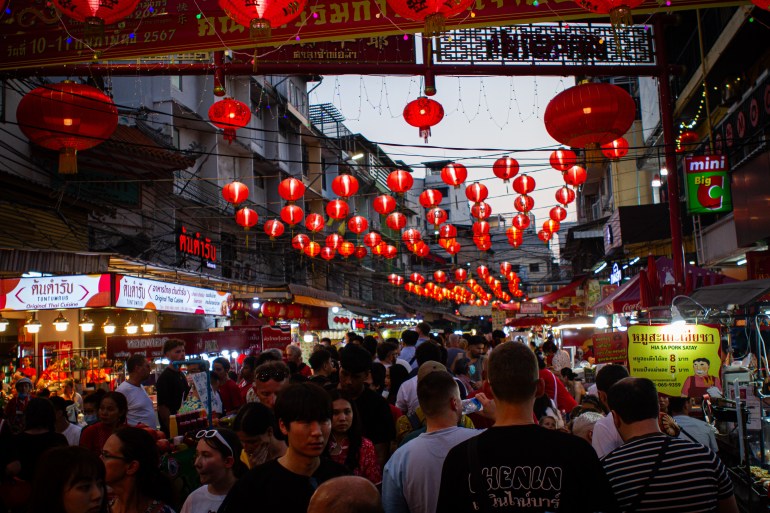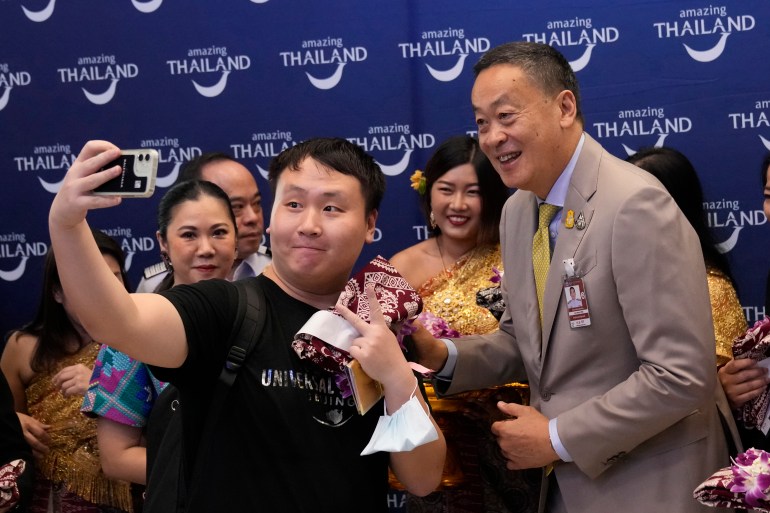Bangkok, Thailand – Bangkok’s Chinatown is bustling with activity, lit by red lanterns and decorative banners celebrating the Lunar New Year holiday.
The region welcomed them Year of the Dragon Last weekend, ethnic Chinese Thais crowded into temples, lighting candles and praying for good luck.
In the bright red interior of Wat Mangkon Kamalawat – the largest Chinese temple in Bangkok – women wore traditional cheongsam dresses and took photos with their loved ones.
Outside, in the hustle and bustle of Yaowarat Road, lion dancers performed while visitors – Thais and legions of tourists – crowded the street to sample food and shop at the market stalls.
Many came from China. Official figures show that hundreds of thousands of Chinese nationals spent the holiday, which began on February 10, in Thailand, where they no longer need visas.
“Destinations in Southeast Asia traditionally rely on a strong New Year holiday to boost the tourism calendar,” Gary Bowerman, a tourism analyst in Kuala Lumpur, told Al Jazeera.
“Thailand has cleverly positioned itself to meet demand for overseas travel from China with its bilateral visa waiver and aggressive marketing in the Chinese market led by the Prime Minister.” This has been well received by Chinese tourists and has encouraged Chinese airlines to do so to expand their capacities [the] Chinese new year.”

Thai Prime Minister Srettha Thavisin began attracting more arrivals from China in September when he announced a temporary visa waiver for Chinese tourists. The short-term agreement soon became permanent after Thailand and China signed an indefinite reciprocal visa waiver for their nationals to visit each other’s country from March 1.
Nithee Seeprae, deputy governor for marketing at the Tourism Authority of Thailand, said the number of Chinese arrivals was encouraging.
“It’s very exciting and [a] “Chinese New Year is a successful Chinese New Year and it is a positive sign for the new visa waiver between China and Thailand because it brings more confidence to Chinese tourists,” he told Al Jazeera. “Now we have 27,000 to 28,000 tourists [arriving each day] Since February 1st, pre-Covid normality has almost returned. Last year at the same time there were 7,000 to 8,000. Last month 500,000 [China visitors arrived].”
Thailand government spokesman Chai Wacharonke said on Saturday that four million tourists arrived in the country from January 1 to February 8, including more than 730,000 Chinese.
Based on Nithee’s approximate figures, Chinese arrivals could reach one million by the end of the month.
“We have promotions with online travel agencies and [we] Coordinate with regular travel agencies to organize a roadshow in major cities in China. Flights are also back at 90 percent [capacity] like before the pandemic because of the visa exemption. We [are trying] “We need to coordinate with influencers and key opinion leaders from China to create the content experience in Thailand,” he added.
Further initiatives planned
Phuket, in southern Thailand, has seen an influx of arrivals in recent weeks.

The island’s hotspot is expected to welcome 49,000 tourists daily through the international airport during Chinese New Year until February 16, according to local media.
The festival falls in the middle of Thailand’s peak season, which typically runs from November to March, and is an important holiday for mainland China.
Ranjeet Viswanathan, director of sales and marketing at the luxury Hyatt Regency Phuket resort, said occupancy was even higher than many had hoped.
“This year started with a bang. Each hotel reported better than expected results in January and this has continued into February. The occupancy rate of our hotel has been over 92 percent since January 1,” he told Al Jazeera.
Chinese tourists account for about 12 percent of the resort’s business and the number of travelers so far in 2024 is five percent higher than a year ago.
According to the Chinese calendar, 2024 is the Year of the Forest Dragon, which can be a time for new ideas, projects and prosperity.
Chinese visitors have long been crucial to Thailand’s travel industry, but despite the surge in arrivals, numbers remain well below those of 2019, the year before the COVID-19 pandemic.
This year, Chinese visitors accounted for more than 11 million of the record 39 million tourists who visited Thailand.
Last year there were more than 3.5 million Chinese arrivals, but that still fell short of the five million predicted by Thai authorities.
Experts attribute the lower than expected numbers to this China’s own economic problems and domestic travel trends. The mass shooting at a Bangkok mall in September in which a Chinese national was killed and the release of the Chinese blockbuster film No More Bets, a film about it Scams in Southeast Asiacould also have played a role.

However, according to Bowerman, the tourism analyst, the recent surge in Chinese visitors to Thailand shows that China’s overseas travel is recovering.
“The strong demand for travel from China to Thailand in the first two months of 2024 suggests that this year will be very different for outbound travel from China than 2023,” he said.
Thai tourism authorities have forecast more than eight million arrivals from China by the end of 2024.
The tourism authority’s Nithee is already working to attract more visitors from China and is in talks to establish new flight routes from China to Thai cities, including Udon Thani in the northeast and Hat Yai in the south. He is optimistic that Thailand is on track to reach its arrival target by the end of the year.
“It’s really promising. We need to keep an eye on these situations, increase tourist confidence and promote more,” he added.





Recent Comments